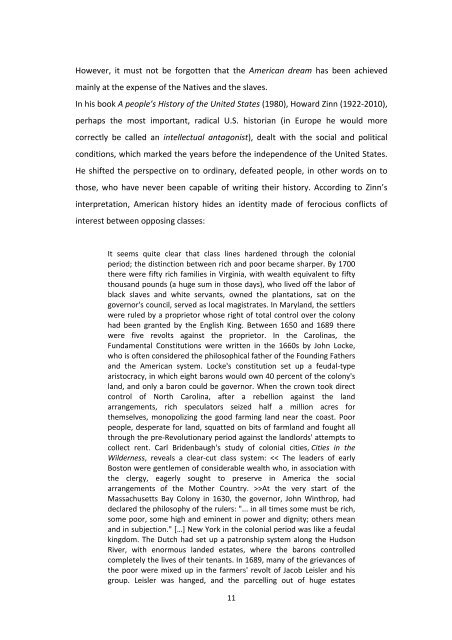building the american landscape - Univerza v Novi Gorici
building the american landscape - Univerza v Novi Gorici
building the american landscape - Univerza v Novi Gorici
You also want an ePaper? Increase the reach of your titles
YUMPU automatically turns print PDFs into web optimized ePapers that Google loves.
However, it must not be forgotten that <strong>the</strong> American dream has been achieved<br />
mainly at <strong>the</strong> expense of <strong>the</strong> Natives and <strong>the</strong> slaves.<br />
In his book A people’s History of <strong>the</strong> United States (1980), Howard Zinn (1922‐2010),<br />
perhaps <strong>the</strong> most important, radical U.S. historian (in Europe he would more<br />
correctly be called an intellectual antagonist), dealt with <strong>the</strong> social and political<br />
conditions, which marked <strong>the</strong> years before <strong>the</strong> independence of <strong>the</strong> United States.<br />
He shifted <strong>the</strong> perspective on to ordinary, defeated people, in o<strong>the</strong>r words on to<br />
those, who have never been capable of writing <strong>the</strong>ir history. According to Zinn’s<br />
interpretation, American history hides an identity made of ferocious conflicts of<br />
interest between opposing classes:<br />
It seems quite clear that class lines hardened through <strong>the</strong> colonial<br />
period; <strong>the</strong> distinction between rich and poor became sharper. By 1700<br />
<strong>the</strong>re were fifty rich families in Virginia, with wealth equivalent to fifty<br />
thousand pounds (a huge sum in those days), who lived off <strong>the</strong> labor of<br />
black slaves and white servants, owned <strong>the</strong> plantations, sat on <strong>the</strong><br />
governor's council, served as local magistrates. In Maryland, <strong>the</strong> settlers<br />
were ruled by a proprietor whose right of total control over <strong>the</strong> colony<br />
had been granted by <strong>the</strong> English King. Between 1650 and 1689 <strong>the</strong>re<br />
were five revolts against <strong>the</strong> proprietor. In <strong>the</strong> Carolinas, <strong>the</strong><br />
Fundamental Constitutions were written in <strong>the</strong> 1660s by John Locke,<br />
who is often considered <strong>the</strong> philosophical fa<strong>the</strong>r of <strong>the</strong> Founding Fa<strong>the</strong>rs<br />
and <strong>the</strong> American system. Locke's constitution set up a feudal‐type<br />
aristocracy, in which eight barons would own 40 percent of <strong>the</strong> colony's<br />
land, and only a baron could be governor. When <strong>the</strong> crown took direct<br />
control of North Carolina, after a rebellion against <strong>the</strong> land<br />
arrangements, rich speculators seized half a million acres for<br />
<strong>the</strong>mselves, monopolizing <strong>the</strong> good farming land near <strong>the</strong> coast. Poor<br />
people, desperate for land, squatted on bits of farmland and fought all<br />
through <strong>the</strong> pre‐Revolutionary period against <strong>the</strong> landlords' attempts to<br />
collect rent. Carl Bridenbaugh's study of colonial cities, Cities in <strong>the</strong><br />
Wilderness, reveals a clear‐cut class system: >At <strong>the</strong> very start of <strong>the</strong><br />
Massachusetts Bay Colony in 1630, <strong>the</strong> governor, John Winthrop, had<br />
declared <strong>the</strong> philosophy of <strong>the</strong> rulers: "... in all times some must be rich,<br />
some poor, some high and eminent in power and dignity; o<strong>the</strong>rs mean<br />
and in subjection." […] New York in <strong>the</strong> colonial period was like a feudal<br />
kingdom. The Dutch had set up a patronship system along <strong>the</strong> Hudson<br />
River, with enormous landed estates, where <strong>the</strong> barons controlled<br />
completely <strong>the</strong> lives of <strong>the</strong>ir tenants. In 1689, many of <strong>the</strong> grievances of<br />
<strong>the</strong> poor were mixed up in <strong>the</strong> farmers' revolt of Jacob Leisler and his<br />
group. Leisler was hanged, and <strong>the</strong> parcelling out of huge estates<br />
11
















